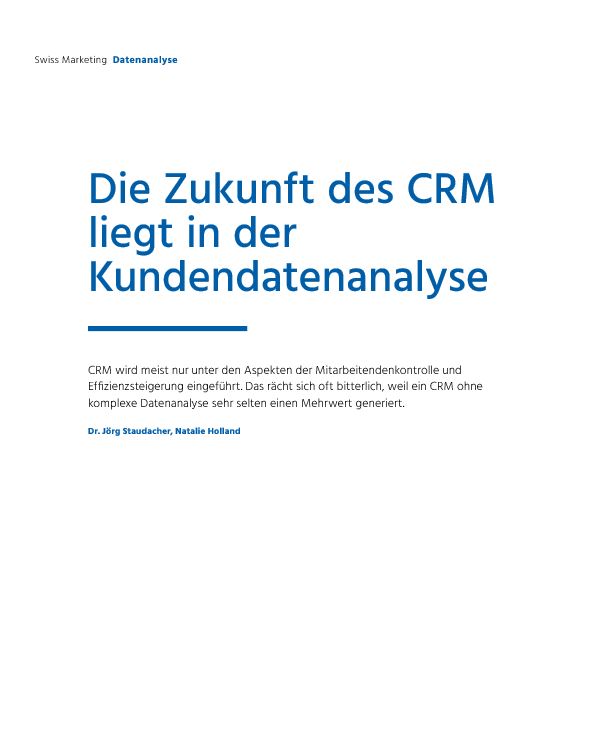The 5 myths about CRM and marketing automation
In a LinkedIn survey, 45% of participants say privacy, technical hazards, or cost argue against incorporating tracking code from a CRM/marketing automation system into a website. Crazy, one might think. Where do these unfounded fears come from? A research project concludes that over 70% of all CRM projects fail. This figure is repeatedly challenged. But we can confirm that many companies find it very difficult to successfully implement a CRM/marketing automation system. In the course of our projects, we repeatedly come across the following 5 myths about CRM and marketing automation.
Myth 1: Data protection
Nowadays, data protection has to be used for everything that could lead to a change in companies. It is the strongest cue to prevent the improvement of a company’s customer focus. Threatening scenarios are painted on the wall that, for example. every company “robs” the unsuspecting customer with the help of its CRM system, or a mistake in the cookie banner threatens a legal dispute of at least CHF 1 million. The data quality in the vast majority of CRM systems is still positively described as subterranean. A wave of lawsuits based on small errors in the cookie banner is not discernible in Switzerland. Thus, it must be stated that the word data protection is mainly used when the person in charge has massive knowledge gaps in the area of CRM/marketing automation. Customer data, such as the email address may be stored only on the basis of the customer’s consent. In addition, all CRM/marketing automation systems allow customers to unsubscribe from newsletters. There are companies that do not pay attention to this. But this has nothing to do with data protection. The rules are clear and if a mistake should happen, the current applications always offer the possibility for customers to log out.
But what are the consequences of misunderstood data protection in practice? For example, companies do not use the web tracking function and thus do not individualize the target group approach. A lack of knowledge about customers leads to average consulting experiences, which are documented year after year in customer experience studies in Switzerland. Without individual, comprehensive customer data, the company is massively limited in its ability to differentiate itself at the customer experience level. Simplified: the ROI of such an application is massively reduced if the data mining functions are not used extensively.
Myth 2: Technical risk
The digital world is full of risks, just like the analog world. A CRM/marketing automation system is connected to multiple peripheral systems via REST APIs. Browser settings are constantly changing and new technical devices require the respective systems to constantly evolve. There are hackers attacking companies. But credit card information or bitcoins are much more lucrative targets than CRM data. The argument of technical risk is also often used to prevent digital transformation. There is no such thing as software without risk. But there is no realization that CRM/marketing systems and their jave codes are a massive security risk. There is no other way to explain the massive growth of these applications. There is a lack of important detailed knowledge in the respective companies. Decision based on agency is convenient but dangerous especially in CRM/marketing automation. The business management is challenged to demand more from the IT departments to better face the new developments.
Myth 3: Expensive
There is no expensive CRM/marketing automation system. There is only a missing business case because the performance of most of the functions for your own company is unknown. Companies need agencies for everything. Be it for adding tracking code to the website, creating newsletters, etc. Without the continuous development of own competences in the field of CRM/marketing automation, every company quickly belongs to the 70%. Thus, the introduction and operation of such systems is never expensive if the employees have the necessary skills. Here, the CAS Customer Relationship Management at the HWZ offers the opportunity to comprehensively increase one’s own competencies.
Myth 4: Software features
What’s in every strategy/marketing and CRM book – customer retention is significantly more profitable than customer acquisition for most companies. We are often asked to select the best CRM/marketing automation system. But most companies do not have any goals and strategies at all in the area of customer retention and customer value enhancement. Thus, a system is often selected that is completely oversized (safety) or a system that has a low cost. But it’s not about software features, it’s about the strength of your post-purchase customer relationship strategy and the ability to use the respective features optimally in the post-purchase experience.
Myth 5: Long term
We live in a time of change. Some providers are evolving rapidly. Some providers remain stagnant in terms of features. Some providers are bought out and other providers charge licensing fees after a few years, which primarily boost their own share price. IT must be understood as a living system of building blocks that is constantly being further developed. As a consequence, this leads to higher costs than in the past, but this is precisely why a CRM/marketing automation system must also provide the highest possible ROI. In many companies, an investment backlog has built up in the area of CRM/marketing automation systems, which is dangerous for survival or systematically prevents growth strategies.
Conclusion on the 5 myths about CRM and marketing automation
Over the past 30 years, these myths have been disproved over and over again. The earth is not a disc. You can want to believe that, but that doesn’t make it reality. It’s not just up to us as a company to understand the gravity of the situation. The European company is indulging in a me-too strategy in the area of customer orientation. All world regions have recognized the potential of customer data and are systematically expanding its use. In Europe, we have discussions about, for example. data protection, which are important, but we should also start claiming a leadership position in this area. Because only those who lead can also influence the rules. In addition, improving customer orientation is a great source of motivation for employees because growth and profit in the company will increase. So let’s finally dispel the 5 myths about CRM and marketing automation and have fun discovering new great worlds.
Our offer in the field of CRM consulting
As an independent CRM consultancy, we support you in developing the optimal CRM strategy. We take a close look at your processes for customer data acquisition and use, as well as your marketing, sales and service activities. The goal is to increase your efficiency in customer relationship management. This is supported by the use of as many automations as possible. In addition, we optimize your growth strategy together with you. This is against the background of improving customer acquisition and retention, so that not only the efficiency but also the effectiveness of your activities is improved.
More article on the topic
CRM is usually introduced only under the aspects of employee control and efficiency increase. This often takes bitter revenge, because a CRM without complex data analysis very rarely generates added value.





